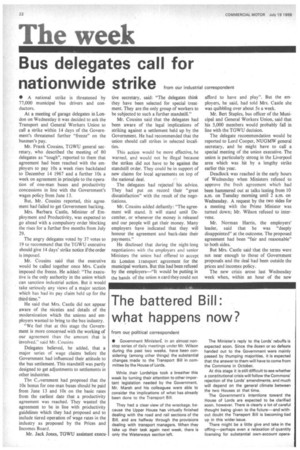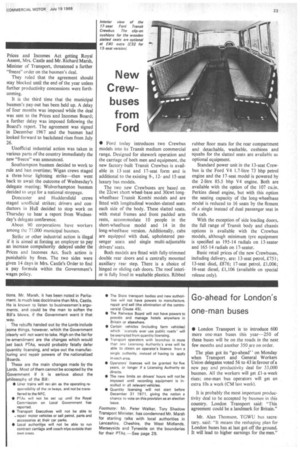Bus delegates call for
Page 24

Page 25

If you've noticed an error in this article please click here to report it so we can fix it.
nationwide strike from obr industrial correspondent
• A national strike is threatened by 77,000 municipal bus drivers and conductors.
At a meeting of garage delegates in London on Wednesday it was decided to ask the Transport and General Workers Union to call a strike within 14 days of the Government's threatened further "freeze" on the busmen's pay.
Mr. Frank Cousins, TGWU general secretary, who described the meeting of 80 delegates as "tough", reported to them that agreement had been reached with the employers to pay lOs a week rises backdated to -December 14 1967 and a further lOs a week on agreement in principle to the operation of one-man buses and productivity concessions in line with the Government's wages policy from June 13.
But, MT. Cousins reported, this agreement had failed to get Government backing.
Mrs. Barbara Castle, Minister of Employment and Productivity, was expected to go ahead with a compulsory order blocking the rises for a further five months from July 29.
The angry delegates voted by 37 votes to 19 to recommend that the TGWU executive should give 14 days' strike notice if the order is imposed.
Mr. Cousins said that the executive would be called together once Mrs. Castle imposed the freeze. He added: "The executive is the only authority in the union which can sanction industrial action. But it would take seriously any views of a major section which has had its pay claim held up for the third time."
He said that Mrs. Castle did not appear aware of the niceties and details of the modernization which the unions and employers wanted to bring to the bus industry.
"We feel that at this stage the Government is more concerned with the working of our agreement than the amount that is involved." said Mr. Cousins
Delegates believed, he added, that a major series or wage claims before the Government had influenced their attitude to the bus settlement. This standstill was partly designed to get adjustments to settlements in other industries.
The C,..vernment had proposed that the lOs bonus for one-man buses should be paid from June 13 and lOs on the basic rates from the earliest date that a productivity agreement was reached. They wanted the agreement to be in line with productivity guidelines which they had proposed and to include tiered operation of wage rates in the industry as proposed by the Prices and Incomes Board,
Mr. Jack Jones, TGWU assistant execu
tive secretary, said: "The delegates think they have been selected for special treatment. They are the only group of workers to be subjected to such a further standstill."
Mr. Cousins said that the delegates had been aware of the legal implications of striking against a settlement held up by the Government. He had recommended that the union should call strikes in selected localities.
This action would be more effective, he warned, and would not be illegal because the strikes did not have to be against the standstill order. They could be in support of new claims for local agreements on top of the national deal.
The delegates had rejected his advice. They had put on record their "great dissatisfaction" with the result of the negotiations.
Mr. Cousins added defiantly: "The agreement will stand. It will stand until December, or whenever the money is released and our people will get their money. Many employers have indicated that they will honour the agreement and back-date their payments."
He disclosed that during the night-long negotiations with the employers and senior Ministers the union had offered to accept its London _transport agreement for the municipal workers. But this had been refused by the employers—"It would be putting in the hands of the union a card they could not
afford to have and play". But the employers, he said, had told Mrs. Castle she was quibbling over about 5s a week.
Mr. Bert Staples, bus officer of the Municipal and General Workers Union, said that his 5,000 members would probably fall in line with the TGWU decision.
The delegate recommendation would be reported to Lord Cooper, NUGMW general secretary, and he might have to call a special meeting of the union executive. The union is particularly strong in the Liverpool area which was hit by a lengthy strike earlier this year.
Deadlock was reached in the early hours of Wednesday when Ministers refused to approve the fresh agreement which had been hammered out at talks lasting from 10 a.m. on Tuesday morning until 2 a.m. on Wednesday. A request by the two sides for a meeting with the Prime Minister was turned down; Mr. Wilson refused to intervene.
Mr. Norman Harris, the employers' leader, said that he was "deeply disappointed" at the outcome. The proposed agreement had been "fair and reasonable" to both sides.
But Mrs. Castle said that the terms were not near enough to those of Government proposals and the deal had been outside the prices and incomes policy.
The new crisis arose last Wednesday week when, within an hour of the new Prices and Incomes Act getting Royal Assent, Mrs. Castle and Mr. Richard Marsh, Minister of Transport, threatened a further "freeze" order on the busmen's deal.
They ruled that the agreement should stay blocked until the end of the year unless further productivity concessions were forthcoming.
It is the third time that the municipal busmen's pay-out has been held up. A delay of four months was imposed while the deal was sent to the Prices and Incomes Board; a further delay was imposed following the Board's report. The agreement was signed in December 1967 and the busmen had looked forward to backdated rises from July 26.
Unofficial industrial action was taken in various parts of the country immediately the new "freeze" was announced.
Southampton busmen decided to work to rule and ban overtime; Wigan crews staged a three-hour lightning strike—then went back to await the outcome of Wednesday's delegate meeting; Wolverhampton busmen decided to urge for a national stoppage.
Doncaster and Huddersfield crews staged unofficial strikes; drivers and conductors in Hull decided to stop work on Thursday to hear a report from Wednesday's delegate conference.
About 90 corporations have workers among the 77,000 municipal busmen.
Strike or other industrial action is illegal if it is aimed at forcing an employer to pay an increase compulsorily delayed under the Prices and Incomes Act. Such action is punishable by fines. The two sides were given 14 days in Mrs. Castle's Order to find a pay formula within the Government's wages policy.




















































































































